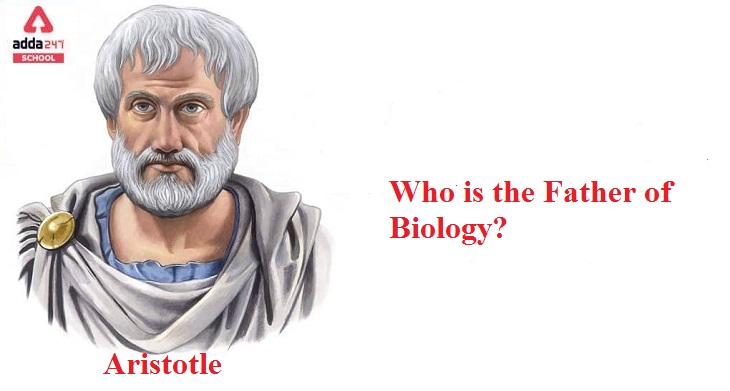Father of Biology
Father of biology is Aristotle- Biology, is a subject that deals with so many curiosities about living organisms. But who? Who created such a diverse field? Let’s know about the father of Biology in this article and a lot more about it, in this article!
Who is the Father of Biology: Aristotle
Aristotle is widely regarded as the “Father of Biology.” In the year 384 BC, Aristotle was born. Aristotle visited Lesvos, which was teeming with fauna, in the 4th century BC. His curiosity with what he discovered there led to the development of a new science called Biology.
Aristotle is renowned as the “Father of Biology” because he investigated the natural world extensively and looked into its beginnings using scientific ideas and systematic observations rather than attributing them to divine intervention. He was also the first to discover animal relationships and develop a classification system.
Let’s dive in deeper and we will learn more about what biology exactly is and who was Aristotle?
Firstly, we will talk about Aristotle and his life and all the related aspects.
Read About: What are isobars?
Who is Father of Biology?
Aristotle was a Greek polymath and philosopher. He was the founder of the Aristotelian tradition and the Lyceum. Aristotle offered a complicated synthesis of the numerous philosophies that had existed before him. As a result, his theory has had a profound impact on practically every aspect of Western knowledge. It is still a topic of intellectual debate in today’s world.
His life, however, is shrouded in mystery. Aristotle was born in the northern Greek city of Stagira. Nicomachus, Aristotle’s father, died when he was a child. Aristotle grew up with a guardian. He enrolled in Plato’s Academy in Athens at a young age and stayed there until he was thirty-seven years old.
Aristotle departed Athens shortly after Plato died. Furthermore, at the request of Philip II of Macedon, Alexander the Great was schooled from the start. In the Lyceum, he constructed a library. This library in the Lyceum aided him in the production of many of his hundreds of papyrus scroll books. Despite the fact that Aristotle produced many beautiful treatises and dialogues for publishing, only about a third of his original work has survived because none of it was meant for publication.
Read About: First National Park in India
Biology Father Name
Aristotle was the first to conduct a systematic study of biology. He spends a lot of time writing about biology. He spent two years studying and documenting the biology of Lesbos and its environs. His information in Animal History, Animal Generation, Animal Movement, and Animal Parts is based on his own observations. Also included are statements made by experts with specialised knowledge, such as beekeepers and fishermen, as well as less precise accounts offered by international travellers.
Aristotle covers the water life in detail, including the catfish, electric ray, and frogfish. He also goes into detail about cephalopods like the octopus and the paper nautilus. He accurately describes the four-chambered forestomachs of ruminants, as well as the hound shark’s ovoviviparous embryological development.
He observes that the structure of an animal is well linked to its function. He further claims that the heron, which lives in soft mud marshes and feeds on fish, has a tall neck, long legs, and a pointed spear-like beak, whereas swimming ducks have short legs and webbed feet.
Modern readers may interpret Aristotle’s ideas as implying evolution, although he considered them as uncommon occurrences. He also mocked Empedocles’ materialist theory of “survival of the fittest” and the notion that accidents may lead to ordered outcomes. In modern language, he never says that diverse species can have an ancestry. He also didn’t believe that one species could evolve into another or that species could become extinct.
Father of Biology, Zoology, and Botany
| Branch of Subject | Father of Branch |
| Father of Botany | Theophrastus |
| Father of Zoology | Aristotle |
| Father of Biology | Aristotle |
| Father of Modern Botany | Linnaeus |
| Father of Endocrinology | Thomas Addison |
| Father of Immunology | Edward Jenner |
| Father of Agronomy | Peter De-Crescenzi |
| Father of Genetics | GJ Mendel |
| Father of Modern Genetics | TH Morgan |
| Father of Cytology | Robert Hooke |
| Father of Palynology | Erdtman |
| Father of Mycology | Micheli |
| Father of Plant Physiology | Stephan Hales |
| Father of Gene Therapy | Anderson |
| Father of Polygenic Inheritance | Kolreuter |
| Father of Surgery and Plastic Surgery | Susruta |
| Father of Anatomy | Herophilus |
| Father of Ethology | Konard Lorentz |
| Father of Cloning | Ian Willmut |
| Father of Chemotherapy | Paul Ehrlich |
| Father of Bryology | Johann Hedwig |
| Father of Mutation | Hugo De Vries |
| Father of Genetic Engineering | Paul Berg |
| Father of Ayurveda | Charka |
| Father of Taxonomy | Carolus Linnaeus |
| Father of Embryology | Aristotle |
| Father of Blood Circulation | William Harvey |
| Father of Medicine | Hippocrates |
| Father of Blood Groups | Karl Landsteiner |
| Father of Paleontology | Leonardo da Vinci |
| Father of DNA Finger Printing | Garrod |
| Father of Gerontology | Korenchevsk |
| Father of Bacteriology | Robert Koch |
| Father of Antibiotics | Alexander Fleming |
| Father of Pathology | Rudolph Virchow |
| Father of Virology | WM Stanley |
| Father of Epidemiology | John Snow |
| Father of Endocrinology | Thomas Addison |
| Father of Homeopathy | Hahnemann |
Father of Biology in India
The “Father of Biology in India” is often attributed to Sir Jagadish Chandra Bose. He was a prominent Indian scientist who made significant contributions to various fields of science, including biology and botany. Bose is renowned for his pioneering work on plant physiology and his experiments that demonstrated the similarities between plant and animal tissues. His research laid the foundation for the study of biophysics and plant biology in India. While he may not be the sole figure responsible for the development of biology in India, he is certainly one of the key figures in its history.
Father of Zoology
“father of zoology” is often attributed to Aristotle, the ancient Greek philosopher and scientist who lived from 384 to 322 BCE. Aristotle made significant contributions to the field of zoology, which is the study of animals. He conducted extensive research on a wide range of animals and wrote two major works related to zoology: “Historia Animalium” (History of Animals) and “De Partibus Animalium” (On the Parts of Animals). These works laid the foundation for the systematic study of animals and their classification, and Aristotle’s observations and ideas greatly influenced the development of zoological science.
Father of Botany
The title “Father of Botany” is commonly attributed to Theophrastus, an ancient Greek philosopher and student of Aristotle. He made significant contributions to the early study of plants, describing and classifying numerous species. His works, such as “Historia Plantarum” (The History of Plants), laid the foundation for the science of botany.









 CUET PG City Intimation Slip 2026 (Out),...
CUET PG City Intimation Slip 2026 (Out),...
 UP Board Class 10 Maths Question Paper 2...
UP Board Class 10 Maths Question Paper 2...
 CBSE Class 12 Physics Answer Key 2026 Ou...
CBSE Class 12 Physics Answer Key 2026 Ou...














